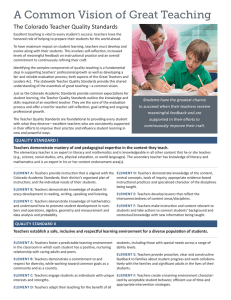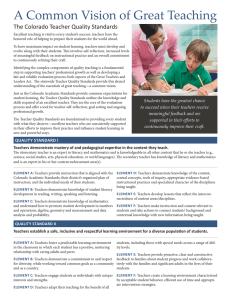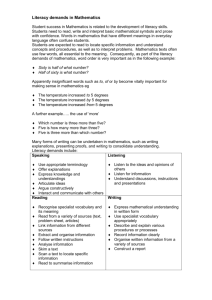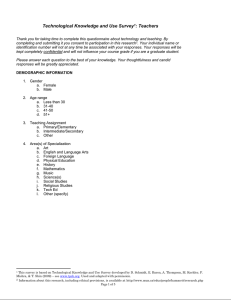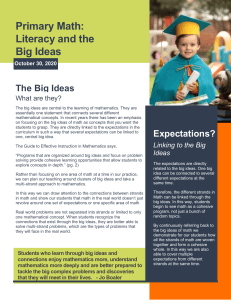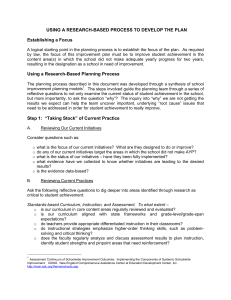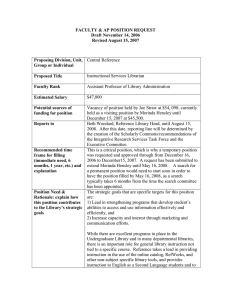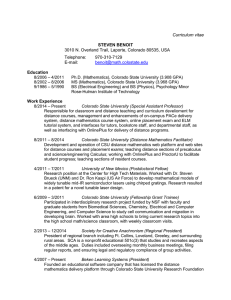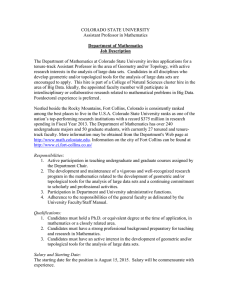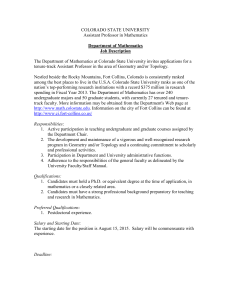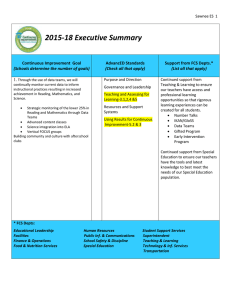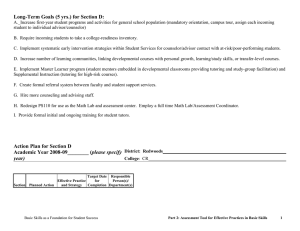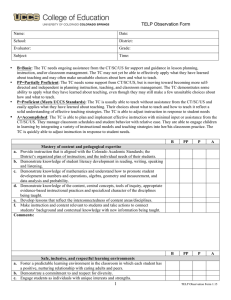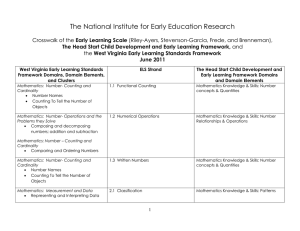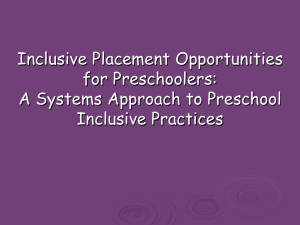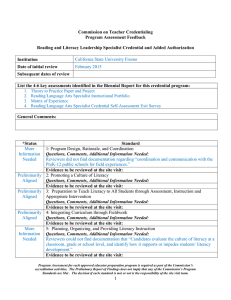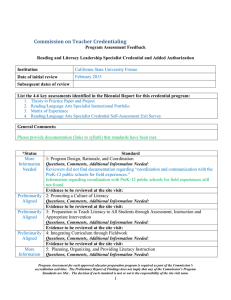Document 10375033
advertisement
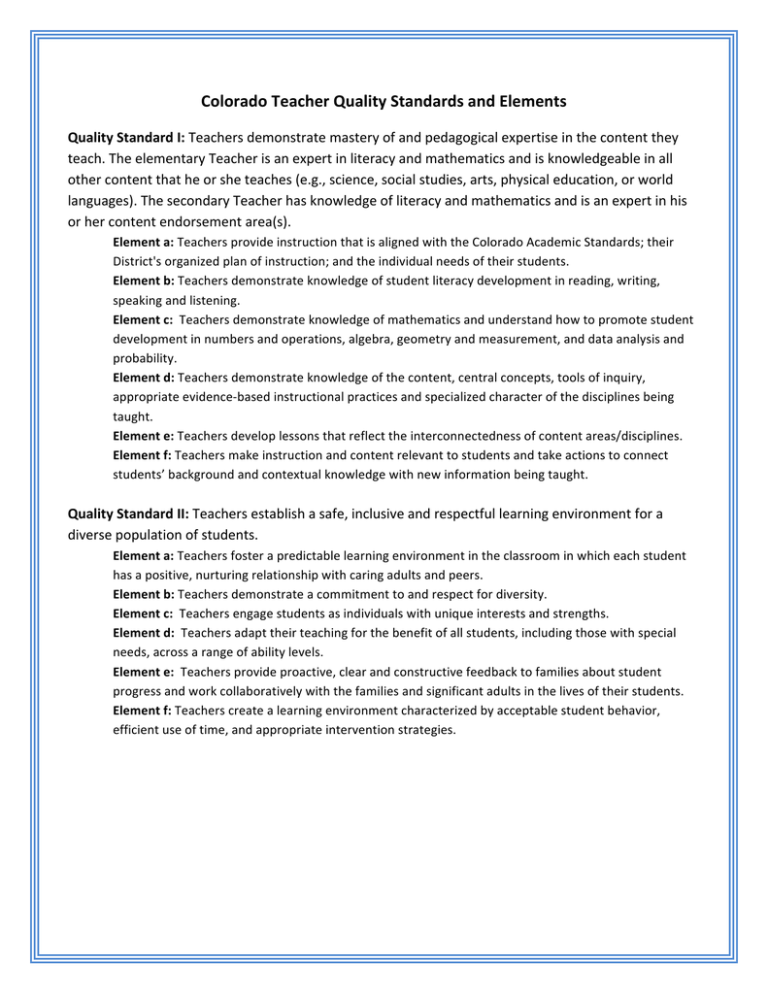
Colorado Teacher Quality Standards and Elements Quality Standard I: Teachers demonstrate mastery of and pedagogical expertise in the content they teach. The elementary Teacher is an expert in literacy and mathematics and is knowledgeable in all other content that he or she teaches (e.g., science, social studies, arts, physical education, or world languages). The secondary Teacher has knowledge of literacy and mathematics and is an expert in his or her content endorsement area(s). Element a: Teachers provide instruction that is aligned with the Colorado Academic Standards; their District's organized plan of instruction; and the individual needs of their students. Element b: Teachers demonstrate knowledge of student literacy development in reading, writing, speaking and listening. Element c: Teachers demonstrate knowledge of mathematics and understand how to promote student development in numbers and operations, algebra, geometry and measurement, and data analysis and probability. Element d: Teachers demonstrate knowledge of the content, central concepts, tools of inquiry, appropriate evidence-­‐based instructional practices and specialized character of the disciplines being taught. Element e: Teachers develop lessons that reflect the interconnectedness of content areas/disciplines. Element f: Teachers make instruction and content relevant to students and take actions to connect students’ background and contextual knowledge with new information being taught. Quality Standard II: Teachers establish a safe, inclusive and respectful learning environment for a diverse population of students. Element a: Teachers foster a predictable learning environment in the classroom in which each student has a positive, nurturing relationship with caring adults and peers. Element b: Teachers demonstrate a commitment to and respect for diversity. Element c: Teachers engage students as individuals with unique interests and strengths. Element d: Teachers adapt their teaching for the benefit of all students, including those with special needs, across a range of ability levels. Element e: Teachers provide proactive, clear and constructive feedback to families about student progress and work collaboratively with the families and significant adults in the lives of their students. Element f: Teachers create a learning environment characterized by acceptable student behavior, efficient use of time, and appropriate intervention strategies. Quality Standard III: Teachers plan and deliver effective instruction and create an environment that facilitates learning for their students. Element a: Teachers demonstrate knowledge of current developmental science, the ways in which learning takes place, and the appropriate levels of intellectual, social, and emotional development of their students. Element b: Teachers plan and consistently deliver instruction that draws on results of student assessments, is aligned to academic standards, and advances students’ level of content knowledge and skills. Element c: Teachers demonstrate a rich knowledge of current research on effective instructional practices to meet the developmental and academic needs of their students. Element d: Teachers thoughtfully integrate and utilize appropriate available technology in their instruction to maximize student learning. Element e: Teachers establish and communicate high expectations for all students and plan instruction that helps students develop critical-­‐thinking and problem solving skills. Element f: Teachers provide students with opportunities to work in teams and develop leadership qualities. Element g: Teachers communicate effectively, making learning objectives clear and providing appropriate models of language. Element h: Teachers use appropriate methods to assess what each student has learned, including formal and informal assessments, and use results to plan further instruction. Quality Standard IV: Teachers reflect on their practice. Element a: Teachers demonstrate that they analyze student learning, development, and growth and apply what they learn to improve their practice. Element b: Teachers link professional growth to their professional goals. Element c: Teachers are able to respond to a complex, dynamic environment. Quality Standard V: Teachers demonstrate leadership. Element a: Teachers demonstrate leadership in their schools. Element b: Teachers contribute knowledge and skills to educational practices and the teaching profession. Element c: Teachers advocate for schools and students, partnering with students, families and communities as appropriate. Element d: Teachers demonstrate high ethical standards.
